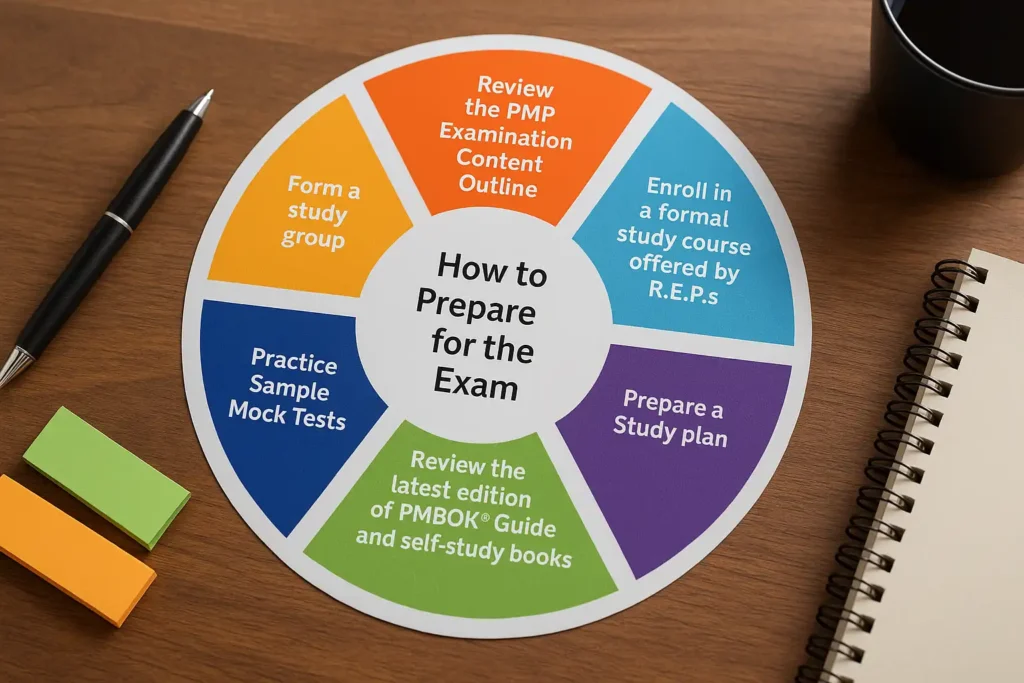PMP® Exam Prep: Your Complete Guide to Passing the PMP® Certification on the First Try
Author: Alvin Villanueva, PMP®, PMI-ACP®; Editor: Geram Lompon; Reviewed by: Grace Payumo, PMP®
Earning your
Intense PMP® exam prep is about building
Whether you are an experienced project manager or working toward that level, the right exam preparation strategy ensures you arrive at the testing center ready to address complex scenarios with clarity and confidence.
Understanding the PMP® Exam and Its Career Value
The PMP certification is widely recognized as the gold standard for project managers. For organizations, PMP-certified professionals mean higher project compliance, greater consistency in delivery, and more substantial alignment between project goals and strategic objectives (Project Management Institute, 2023, PMP® Certification Handbook).
For individuals, the credential opens opportunities for advancement, increases earning potential, and demonstrates advanced
It is also a gateway to a professional community. Earning your PMP connects you with project managers worldwide, giving you access to shared insights, case studies, and continuous learning opportunities that keep your skills relevant.
How the PMP® Exam Reflects the Full Project Lifecycle
The PMP exam evaluates your ability to integrate processes across the full project lifecycle, from initiating to closing. For example, suppose a key stakeholder withdraws support midway through a project. In that case, you need to determine the correct domain, identify relevant practices, and apply the most effective solution quickly and accurately.
This integrated perspective mirrors real-world project challenges, where one decision can affect cost, schedule, quality, and stakeholder engagement. Adequate PMP exam preparation strengthens your ability to recognize dependencies, weigh trade-offs, and adjust strategies in real time.
PMP® Exam Format, Domains, and Key Concepts You Will Encounter
The exam covers three performance domains: People, Process, and Business Environment.
- People address leadership, conflict resolution, and stakeholder engagement.
- Process includes predictive, agile, and hybrid methodologies along with scope, schedule, cost, and risk management tools.
- Business Environment focuses on project compliance, organizational change, and ensuring project benefits align with strategic objectives.
The questions are often scenario-based and require applying key concepts rather than recalling definitions. Strong preparation involves practicing how to identify the best answer when more than one option appears correct (PMI, 2023).
The Role of the Project Management Institute
The
PMI-authorized training partners offer expert instruction, updated course material, and realistic practice tests, which can increase your confidence and improve your first attempt success rate.
Connecting Project Compliance and PMP® Success
The business environment domain may represent a smaller portion of the exam, but it is vital to PMP success. It addresses how project managers navigate regulatory requirements, adapt to organizational change, and sustain project benefits in dynamic environments (Turner, 2020).
Understanding this domain can make the difference between a passing score and a near miss.
Building Your PMP® Exam Prep Plan for Success
A detailed study plan keeps exam preparation organized and effective. Like a project schedule, it should include milestones, allow for tracking progress, and adapt to results over time. Include a balanced mix of reading, practice questions, and review sessions that target both strong and weak areas.
If you balance study time with professional and personal responsibilities, short and consistent study blocks are more effective than long, irregular sessions. Communicating your PMP journey to colleagues and family helps protect your dedicated prep time.
Maximizing the Value of PMP® Exam Prep Books and Study Guides
Select PMP exam prep books that align with the current Exam Content Outline. Summarize each section in your own words, create flashcards for complex topics, and connect the material to your own
Cross-referencing between books helps fill knowledge gaps and ensures consistent understanding.
Adapting Your Study Methods to Your Learning Style
Visual learners might rely on process charts, mind maps, and diagrams. Auditory learners can benefit from recorded lessons or reading notes aloud. Kinesthetic learners often perform best with interactive exercises, practice exams, and simulations.
Combining multiple approaches strengthens retention.
Addressing Weak Areas Without Rote Memorization
Identify recurring errors in practice exam results and focus on understanding the reasoning behind the correct answer.
For example, if risk management is a weak area, create practice scenarios and apply qualitative and quantitative techniques to determine the correct response.
Choosing the Right PMP® Exam Prep Course
Your choice between live and on-demand formats depends on your learning style, schedule, and discipline. Live courses offer interaction and accountability, while on-demand courses allow flexibility. Both should provide updated curriculum, practice tests, and opportunities to clarify complex topics.
Seek prep courses from PMI Authorized Training Partners. The best courses integrate real-world case studies, deliver expert instruction, and explain complex topics clearly. Subject matter experts can turn challenging areas into strengths by clarifying their practical applications.
Making Practice Exams and Interactive Exercises a Priority
Practice exams build familiarity with exam structure, pacing, and mental stamina. Treat each as a dress rehearsal, using the exact timing and environment as the real test. Review incorrect answers carefully, focusing on the thought process rather than memorization.
Interactive exercises such as group discussions and case study analysis help deepen understanding and prepare you for real-world application.
Understanding Hybrid Methodologies
Modern projects frequently combine predictive and agile approaches. The exam reflects this reality, requiring you to adapt to both. Practice responding to scenarios where elements of each methodology are present so you can move fluidly between them.
Core Resources for PMP® Exam Preparation
The most effective PMP exam prep books combine theory, practical examples, and practice questions. Digital resources, mobile apps, and online courses offer additional flexibility, especially for reinforcing concepts during short breaks.
High-quality practice questions and tests mirror real exam difficulty, helping you build speed and accuracy. Randomizing your review order prevents over-reliance on memorized sequences. Tracking your scores and time spent per domain reveals where to adjust your study plan.
Exam Taking Strategies That Deliver Results
On exam day, arrive early, stay calm, and focus on your preparation rather than last-minute cramming. Read each question twice, look for keywords indicating the project phase, and eliminate incorrect answers before deciding.
Pace yourself by dividing the exam into manageable question blocks, leaving time for review. Avoid second-guessing unless you are certain an answer is wrong.
Applying PMP® Knowledge Beyond the Exam
Passing the PMP exam is the beginning of a new professional chapter. Apply the same disciplined approach you used in exam preparation to managing projects, leading teams, and improving processes.
Use your certification to pursue leadership roles, contribute to professional communities, and mentor other students. Staying engaged with PMI’s latest practices and earning PDUs ensures your
For structured guidance and resources designed to help you prepare effectively, explore the ROSEMET PMP Course Bundle. It combines expert instruction, practice exams, and interactive lessons tailored to support your PMP journey.
From Exam Preparation to Long-Term Career Impact
Your PMP exam prep is an investment in both career advancement and professional credibility. A solid study plan, quality resources, and practical exam-taking strategies increase your chances of passing on the first try (PMI, 2023).
The habits you develop through exam preparation, planning, adaptability, and analytical thinking will strengthen every project you lead. With preparation, persistence, and the proper guidance, your PMP certification can be the foundation for a successful and impactful career in
References
Anderson, L. S., & Adams, R. (2021). Mastering leadership: An integrated framework for breakthrough performance and extraordinary business results (2nd ed.). Wiley.
Kerzner, H. (2022). Project management: A systems approach to planning, scheduling, and controlling (13th ed.). Wiley.
Project Management Institute. (2023). A guide to the
Project Management Institute. (2023). PMP® certification handbook. https://www.pmi.org/-/media/pmi/documents/public/pdf/certifications/pmp-handbook.pdf
Turner, J. R. (2020). The handbook of project-based management: Leading strategic change in organizations (4th ed.). McGraw-Hill Education.

